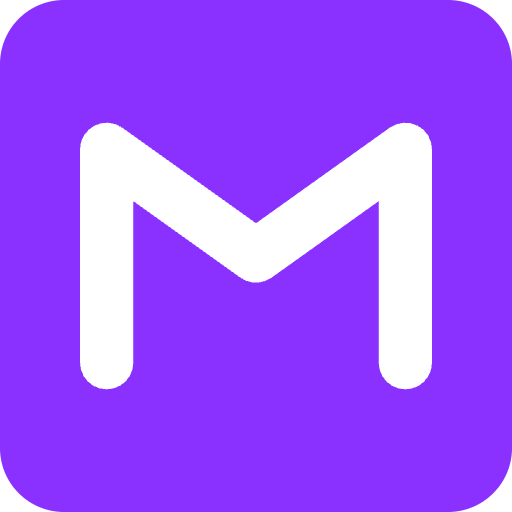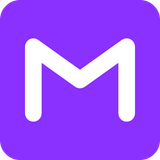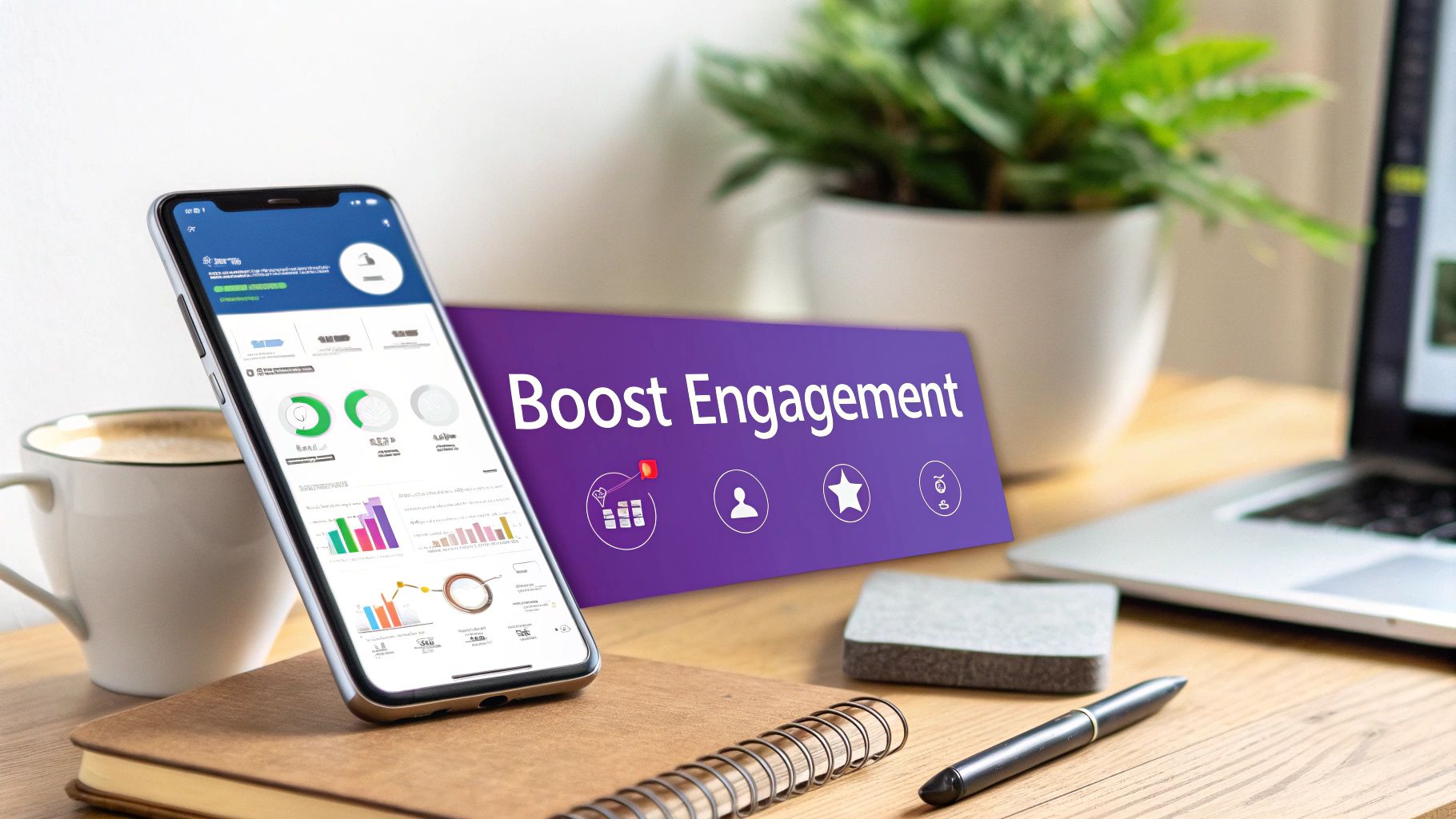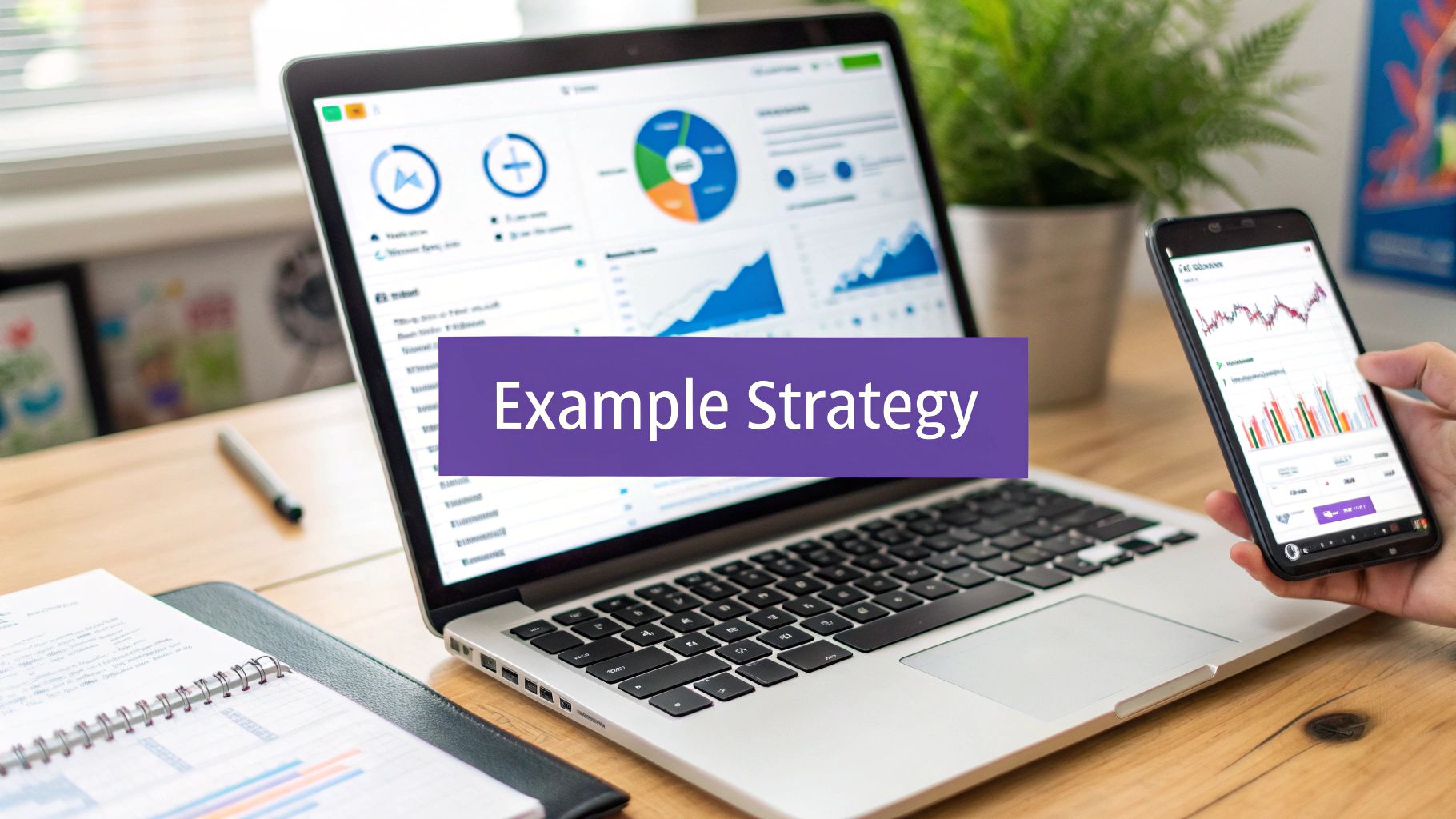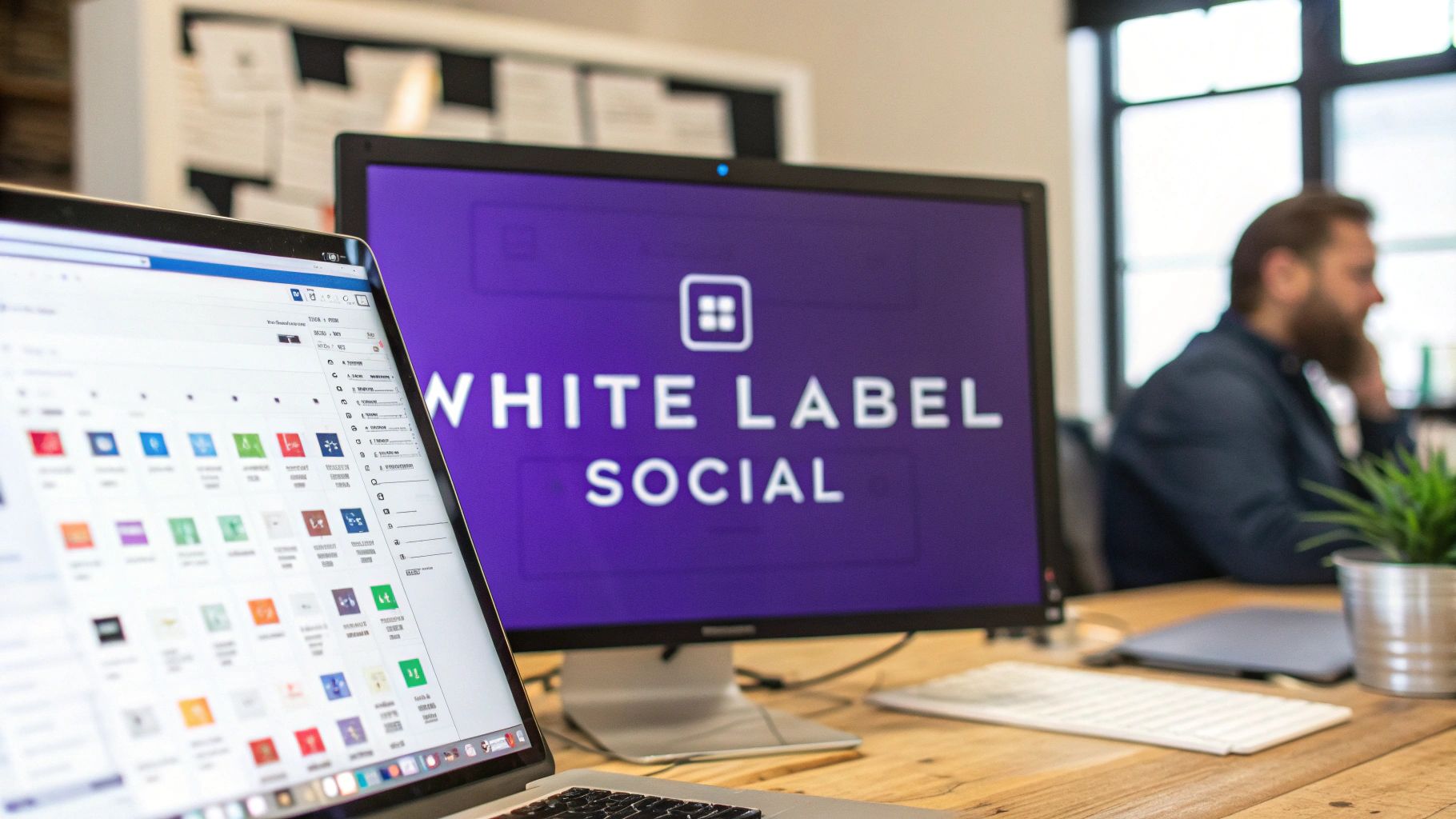Top 12 Social Media Management Tools for Agencies in 2025
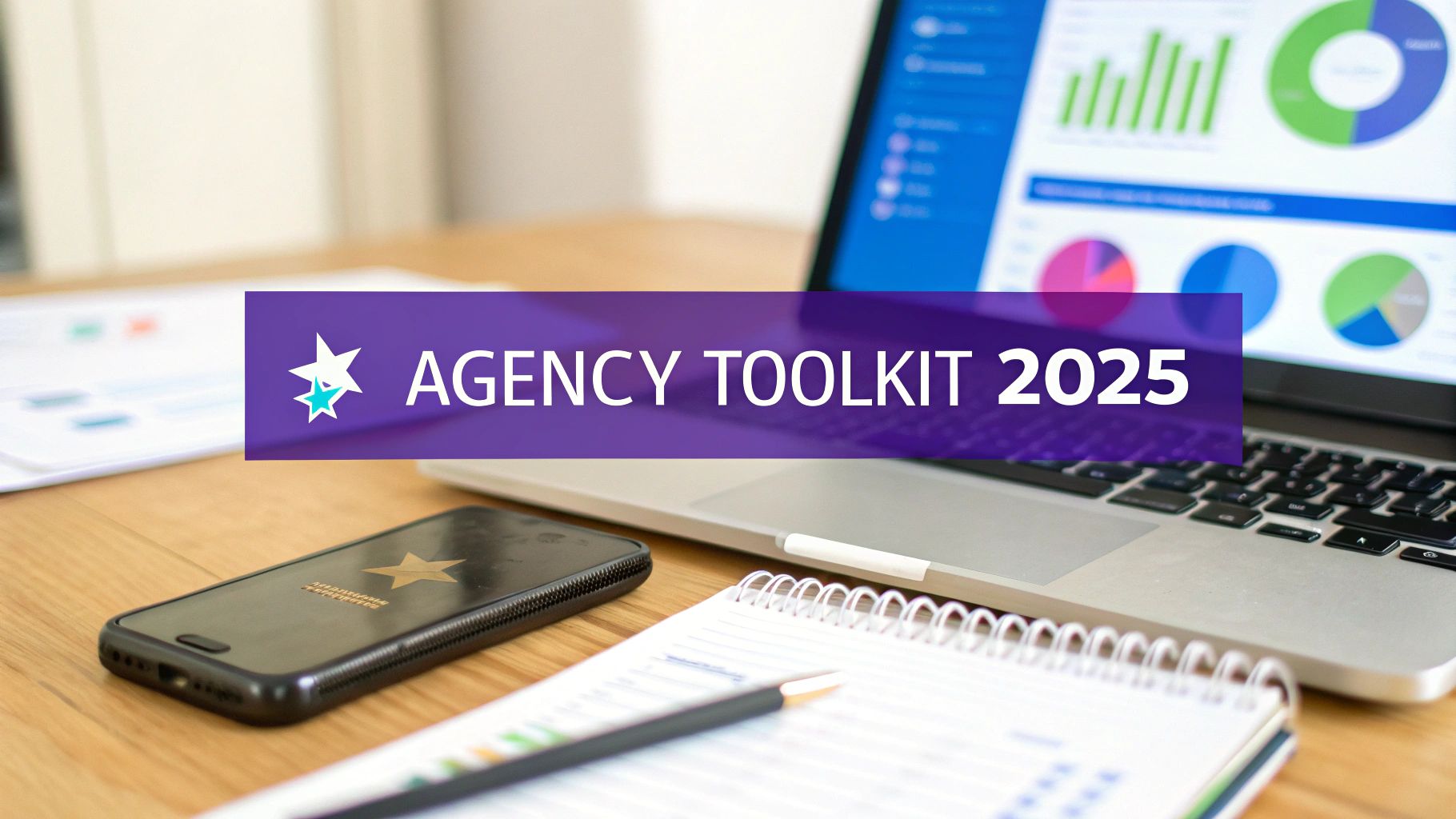
Managing multiple social media clients is a complex juggling act. Between content creation, scheduling, client approvals, community engagement, and performance reporting, the workload can quickly become overwhelming. This is where a robust social media management platform transitions from a "nice-to-have" to a mission-critical component of your agency's tech stack. The right tool not only streamlines your workflow but also provides the structure needed to scale your operations efficiently, onboard new clients smoothly, and deliver measurable results.
Finding the perfect fit, however, is a significant challenge. The market is saturated with options, each claiming to be the ultimate solution. This guide cuts through the noise. We've compiled an in-depth analysis of the best social media management tools for agencies, focusing specifically on features that matter most for client-based work. We'll move beyond generic feature lists to provide a practical evaluation of each platform's strengths and weaknesses for an agency context. This includes a close look at collaboration workflows, client approval systems, white-label reporting capabilities, and multi-brand management.
In this resource, you will find:
- Detailed reviews of top-tier platforms like Sprout Social, Agorapulse, and Sendible.
- Honest assessments of their pros, cons, and ideal use cases for different agency sizes.
- Screenshots and direct links to help you visualize and explore each tool further.
Our goal is to equip you with the information needed to select a platform that aligns with your agency’s specific needs, budget, and growth ambitions. While these tools excel at social media execution, a comprehensive digital strategy often requires more. Many agencies find it beneficial to explore top tools for reputation management to offer a more holistic service suite that protects and enhances their clients' brand presence online. Let's dive into the platforms that can help you reclaim your time and scale your agency effectively.
1. MakerBox
MakerBox emerges as a powerful, AI-driven platform that excels in a unique, foundational aspect of social media management: profile optimization. While many tools focus solely on scheduling and analytics, MakerBox revolutionizes how agencies establish and refine their clients' online presence from the ground up. Its core strength lies in leveraging proprietary AI, trained on over 100,000 high-performing profiles, to generate compelling bios, cover images, and social content in under 30 seconds.
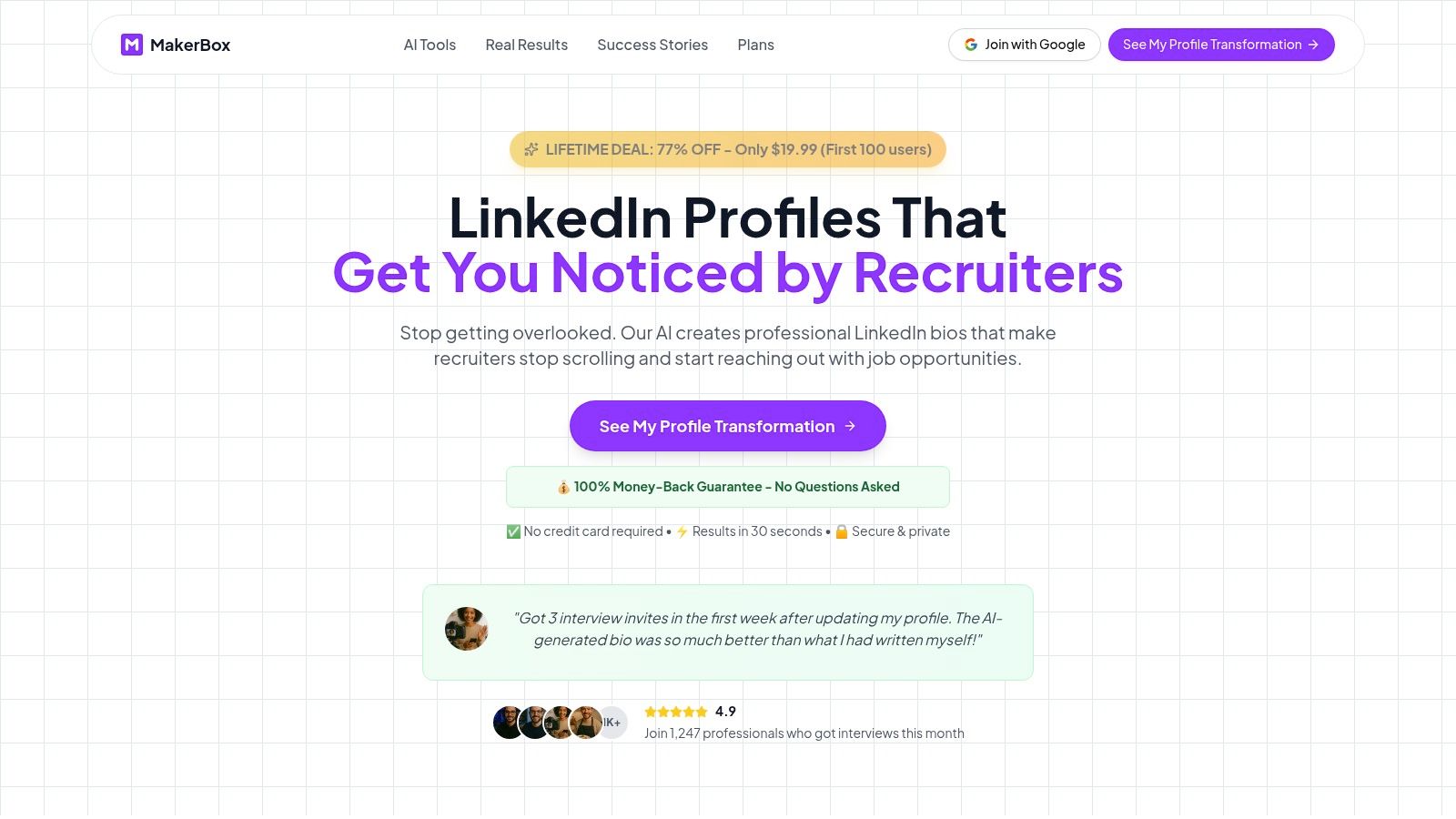
This tool is a game-changer for agencies onboarding new clients or rebranding existing ones, delivering an average of 3.5× more engagement. Instead of spending hours on creative brainstorming, agency teams can instantly produce assets tailored to various professional tones (creative, casual, friendly), ensuring brand consistency across platforms. The platform's AI Portrait Magic is another standout feature, transforming simple selfies into professional, artistic headshots without the cost of a photoshoot.
Key Agency-Focused Features & Use Cases
MakerBox provides a strategic advantage by automating the often tedious but critical first steps of a social media campaign. It is an ideal solution for establishing a strong, optimized foundation upon which further content strategy can be built.
- Rapid Client Onboarding: Use MakerBox to generate a complete set of optimized social media profiles for a new client in minutes, demonstrating immediate value and setting a professional tone from day one.
- AI-Powered Content Creation: Beyond profiles, the platform generates multi-platform social media posts, helping agencies fill content calendars with engaging copy that aligns with the client's newly optimized brand voice.
- Cost-Effective Visuals: The AI portrait generator allows agencies to offer high-quality, branded profile images to clients without coordinating or budgeting for expensive photoshoots.
- Performance Tracking: The platform includes analytics to monitor the impact of its optimizations, enabling agencies to report tangible improvements in engagement and connection rates to clients.
Pricing & Scalability
MakerBox offers an exceptionally accessible entry point with its popular Lifetime Deal, priced at just $19.99 for the first 100 users. This one-time payment provides full platform access, with AI usage costs controlled by connecting your own OpenAI API key. While the platform's advanced multi-client workspaces and white-label options are still in development, its current feature set makes it one of the best social media management tools for agencies focused on foundational brand building and efficiency.
Pros:
- AI-powered profile generation creates optimized assets in seconds.
- Proprietary models trained on vast data deliver proven engagement boosts.
- AI portrait feature offers a unique, cost-saving solution for professional visuals.
- Extremely affordable Lifetime Deal provides significant long-term value.
Cons:
- Users must bring their own OpenAI API key for the Lifetime Deal, adding a minor setup step.
- Dedicated agency features like multi-client workspaces are not yet released.
Website: https://www.makerbox.io
2. Sprout Social
Sprout Social is an enterprise-grade platform that positions itself as a premium choice among the best social media management tools for agencies. It offers a comprehensive, all-in-one solution that covers publishing, engagement, analytics, and social listening, all wrapped in a polished, user-friendly interface. The platform excels in creating streamlined workflows for agencies managing multiple client accounts, from content creation to final approval and reporting.
Its Unified Smart Inbox is a standout feature, consolidating messages from all connected profiles into a single, manageable stream. This allows team members to tag, assign, and resolve incoming messages like support tickets, ensuring no client interaction is missed.
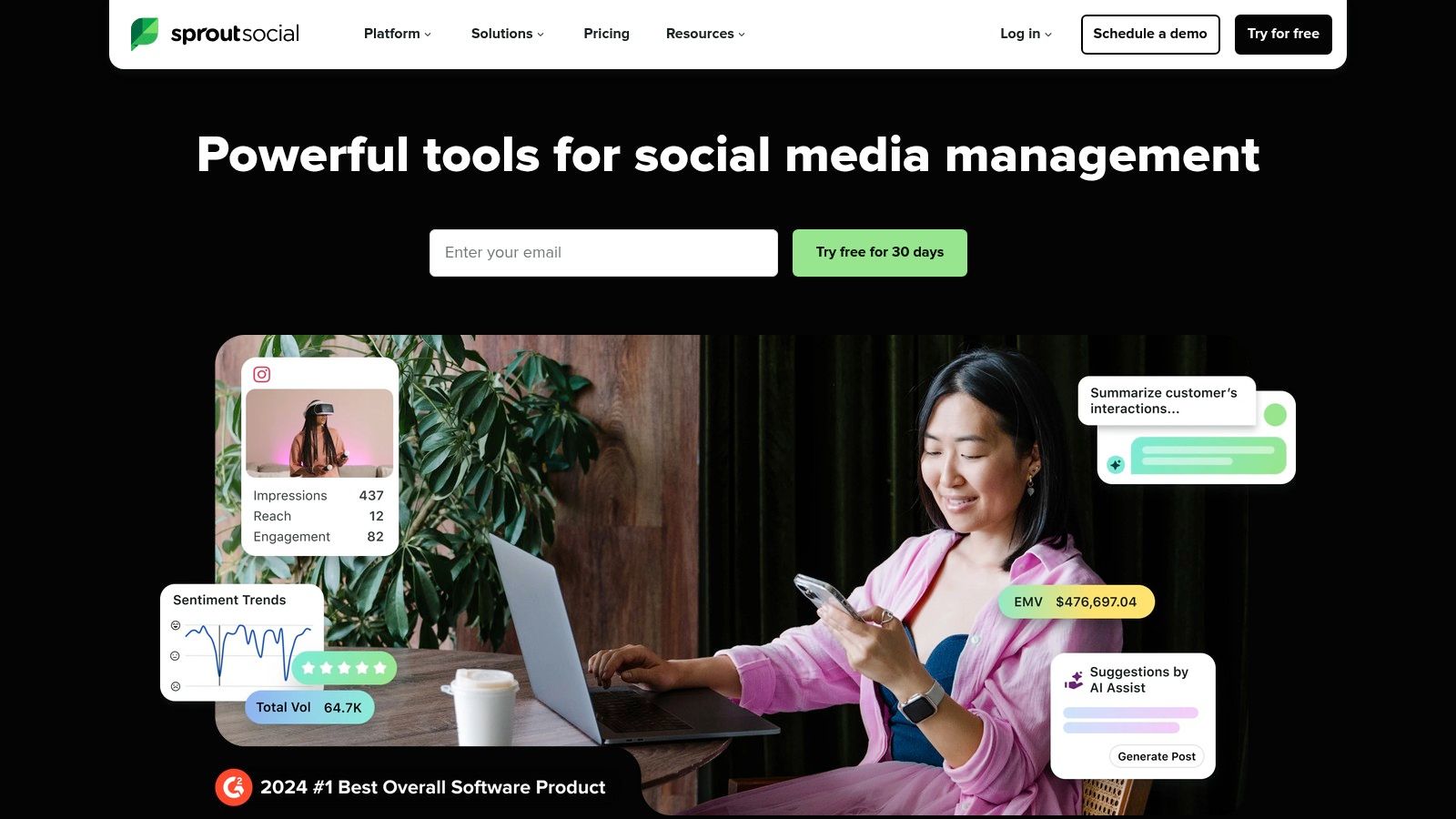
Key Agency Features & Use Cases
Sprout Social’s agency-centric design is evident in its collaboration tools. The platform’s approval workflows are particularly robust, allowing junior team members to draft posts that senior managers or even clients can review and approve directly within the app. This creates a clear, auditable trail for content sign-off.
The reporting suite is another major differentiator. Agencies can generate beautiful, client-ready reports with just a few clicks, customizing them with their own branding. These reports go beyond surface-level metrics, providing deep insights into audience demographics, content performance, and competitive analysis.
Pricing and Limitations
Sprout Social's pricing is its most significant hurdle for smaller agencies. Plans are priced per user, per month, which can become costly as a team grows. The Standard plan starts at $249 per user/month, with the popular Professional plan at $399 per user/month. Advanced features like premium listening and sentiment analysis are often expensive add-ons.
| Feature | Standard Plan ($249/user/mo) | Professional Plan ($399/user/mo) |
|---|---|---|
| Social Profiles | 5 Profiles | Unlimited Profiles |
| Content Calendar | Yes | Yes |
| Approval Workflows | No | Yes |
| Paid Ad Reporting | Limited | Yes |
| Competitive Reports | Basic | Yes |
Pros:
- Excellent, presentation-ready reporting and analytics.
- Strong collaboration and approval workflows for multi-client teams.
- Intuitive user interface that simplifies complex tasks.
Cons:
- High per-seat pricing can be prohibitive for larger teams.
- Advanced listening and analytics features require costly add-ons.
Website: https://sproutsocial.com
3. Hootsuite
Hootsuite is one of the most established and widely recognized names among the best social media management tools for agencies. It offers a powerful, all-in-one platform designed to handle a high volume of social accounts and content, making it a reliable choice for agencies scaling their operations. Its core strengths lie in its broad network support, robust scheduling capabilities, and comprehensive team management features that facilitate multi-client workflows.
The platform's dashboard, organized around customizable "streams," allows agency teams to monitor multiple feeds, keywords, and conversations simultaneously. This is particularly useful for tracking client brand mentions, competitor activity, and industry trends from a single, unified view.
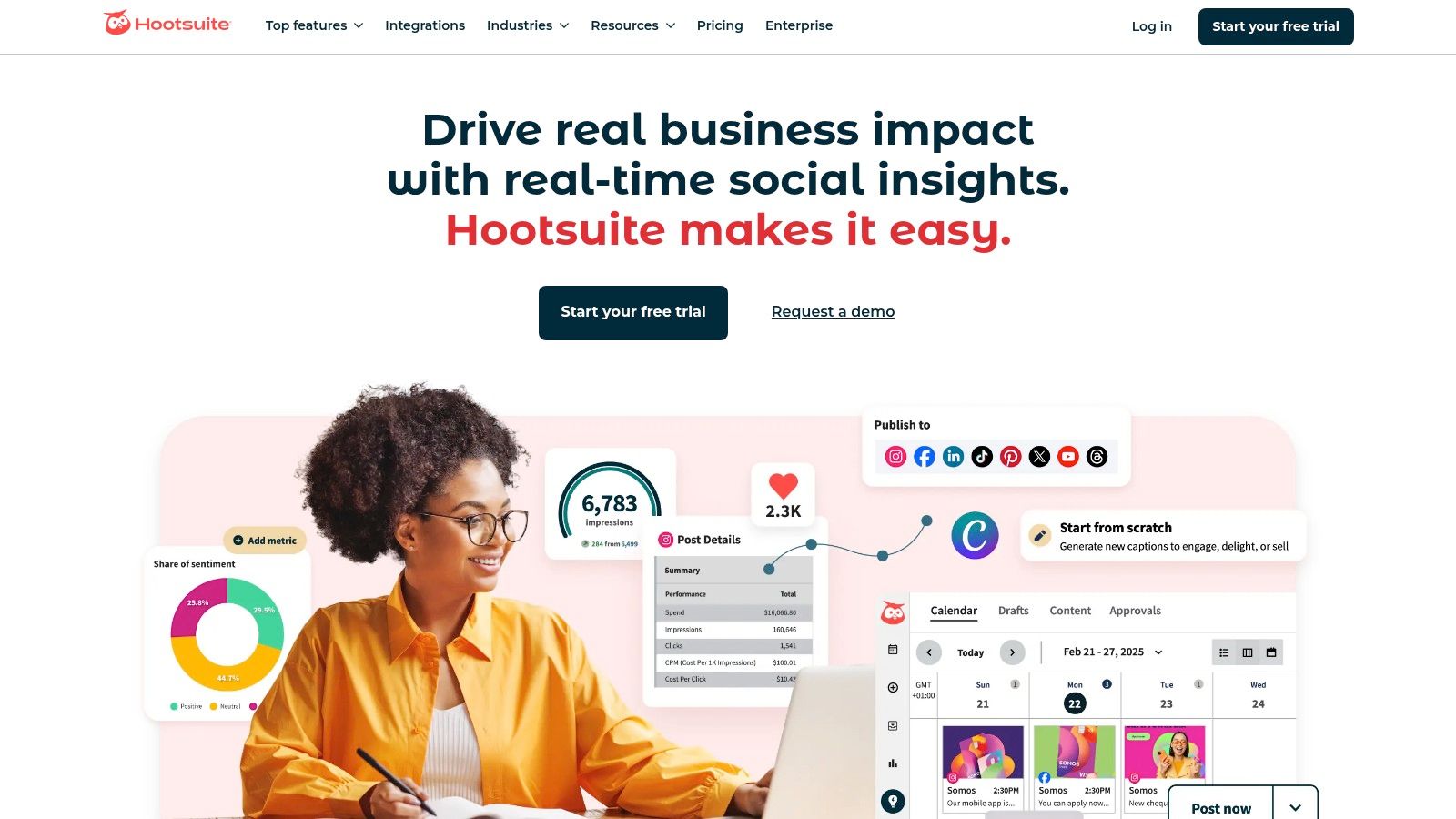
Key Agency Features & Use Cases
Hootsuite's agency-focused toolkit excels at content management and team collaboration. Its bulk scheduling feature is a massive time-saver, allowing managers to upload and schedule up to 350 posts at once from a CSV file. This is ideal for planning and executing large-scale client content calendars. To support this, you can explore automated social media posting to further streamline your content strategy.
The platform provides granular team permissions and approval workflows, ensuring brand safety and consistency. Agencies can assign specific roles and social account access to team members and set up multi-step approval processes before content goes live. The shared inbox also helps route messages to the right person, ensuring prompt and organized client engagement.
Pricing and Limitations
Hootsuite’s pricing can be complex, scaling with features, users, and the number of social accounts. The Professional plan is a common starting point for small teams, but larger agencies will need the Team or Enterprise plans to access unlimited users, custom branding, and advanced reporting. While powerful, some of the most desired features, like in-depth analytics and social listening, are reserved for higher-tier plans.
| Feature | Professional Plan ($99/mo) | Team Plan ($249/mo) |
|---|---|---|
| Social Profiles | 10 Profiles | 20 Profiles |
| Users | 1 User | 3 Users |
| Bulk Scheduling | Yes | Yes |
| Approval Workflows | No | Yes |
| Team Assignments | No | Yes |
Pros:
- Excellent scalability from small agencies to large enterprise teams.
- Mature and extensive ecosystem with hundreds of app integrations.
- Powerful bulk scheduling capabilities save significant time.
Cons:
- The user interface can feel dated and less intuitive than some modern competitors.
- Key agency features like approvals and advanced analytics are locked behind more expensive plans.
Website: https://www.hootsuite.com
4. Agorapulse
Agorapulse has carved out a strong reputation as one of the best social media management tools for agencies, offering a robust, user-friendly platform without the enterprise-level price tag of some competitors. It provides a comprehensive suite of tools for publishing, engagement, listening, and reporting, all designed to streamline agency workflows. The platform is particularly well-regarded for its unified social inbox, which simplifies managing conversations across multiple client accounts.
Agorapulse’s focus on clear, actionable data makes it an excellent choice for agencies that need to prove their value. Its ROI tracking feature, which integrates with Google Analytics, directly connects social media activities to website conversions and business goals, providing a powerful narrative for client reports.
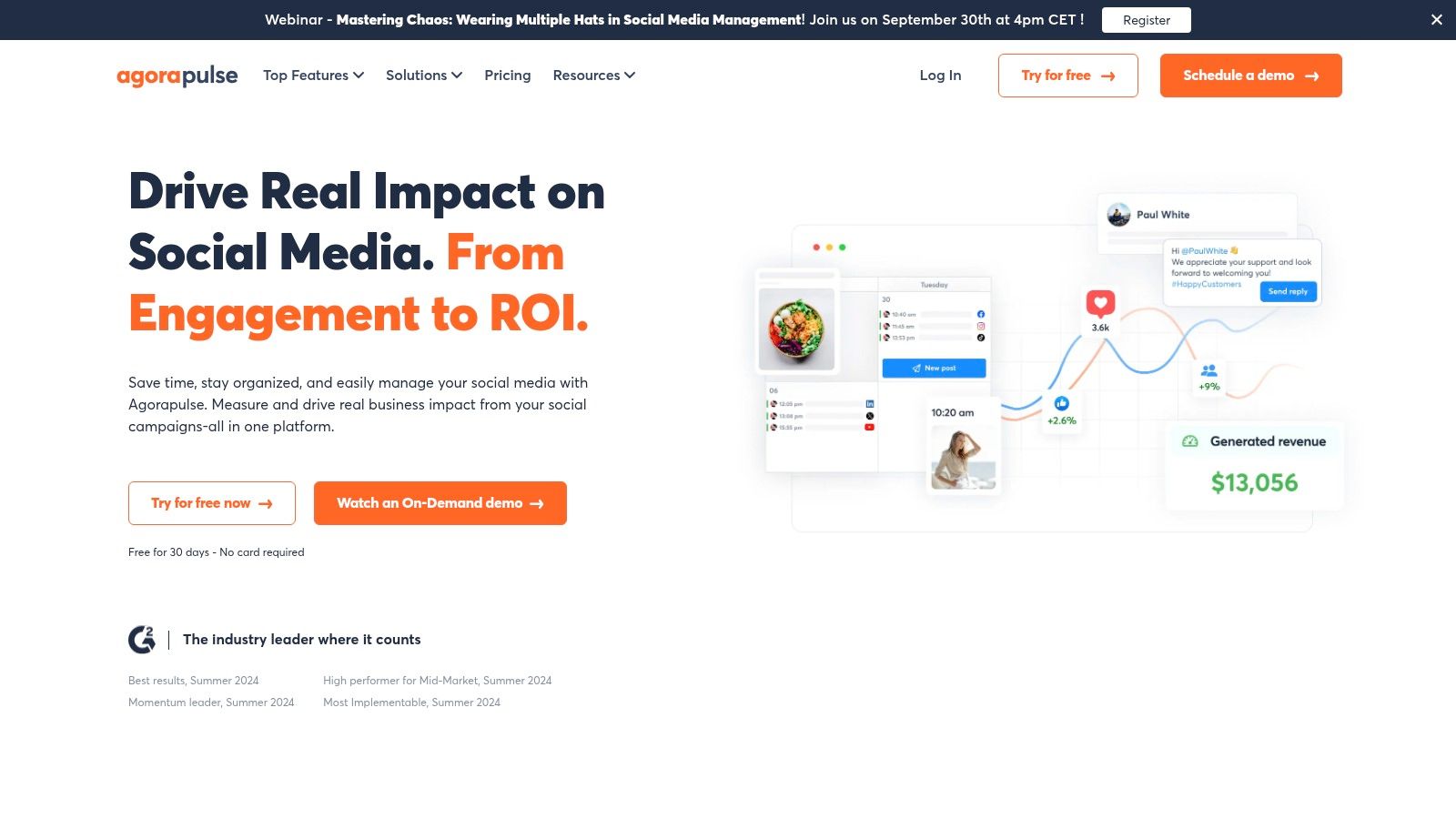
Key Agency Features & Use Cases
Agorapulse excels in team collaboration and client management. Features like shared calendars, content approval workflows, and role-based permissions allow agencies to manage multiple clients efficiently and securely. One standout feature is the ability to monitor and manage ad comments across Meta, TikTok, and LinkedIn, an often-overlooked area of community management.
The platform's reporting capabilities are highly valued by agencies. You can create unlimited custom, white-label reports that are clean, easy to understand, and client-ready. This is crucial for demonstrating performance and maintaining strong client relationships, which is a key part of any successful social media branding strategy. SSO support on higher-tier plans also provides enterprise-grade security as an agency scales.
Pricing and Limitations
Agorapulse uses a per-user pricing model, but it also charges for additional social profiles beyond the plan's base allocation, which can add up for agencies with many clients. The Standard plan starts at $49 per user/month, with the popular Professional plan at $79 per user/month. More advanced listening and ROI tracking features are reserved for higher-tier plans.
| Feature | Standard Plan ($49/user/mo) | Professional Plan ($79/user/mo) |
|---|---|---|
| Social Profiles | 10 Profiles | 10 Profiles |
| Ad Comments | Meta Only | Meta, TikTok, LinkedIn |
| Custom Reports | Limited | Yes |
| SSO Support | No | No (Available on higher plans) |
| Team Workflows | Yes | Yes |
Pros:
- Excellent client-facing reporting and white-labeling options.
- Scales effectively from small teams to larger organizations.
- Strong inbox management, including ad comment monitoring.
Cons:
- Per-user pricing plus additional fees for extra profiles can become costly.
- Advanced listening and ROI features are gated behind more expensive plans.
Website: https://www.agorapulse.com
5. Sendible
Sendible is a social media management tool designed from the ground up with agencies in mind. It offers a powerful, scalable solution for managing numerous client accounts without the enterprise-level price tag. The platform provides a comprehensive suite of tools covering publishing, engagement, analytics, and team collaboration, making it a strong contender among the best social media management tools for agencies that need both functionality and value.
The platform's core strength lies in its agency-focused architecture. Features like client dashboards with custom user permissions, automated reporting, and a priority inbox help streamline day-to-day operations. This allows agencies to efficiently manage client workflows from a single, centralized hub.
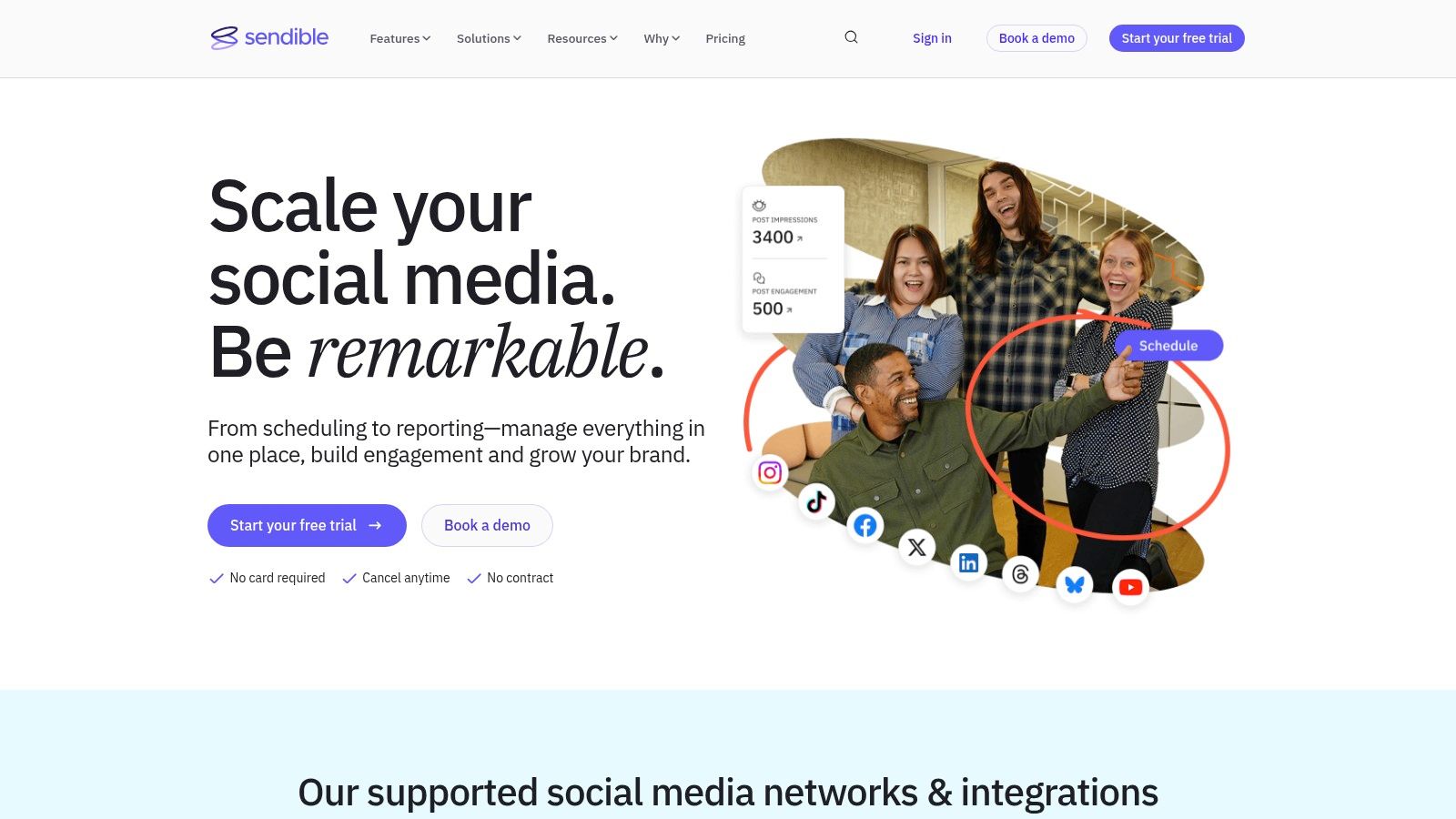
Key Agency Features & Use Cases
Sendible's client management capabilities are a major draw. Agencies can create dedicated dashboards for each client, granting them access to approve content or view live report links. This fosters transparency and simplifies the often-tedious approval process. The platform also offers a white-label add-on, enabling agencies to brand the entire portal as their own for a seamless client experience.
Its reporting tools are both robust and flexible. You can build custom, drag-and-drop reports or use pre-built templates to showcase key metrics. For a deeper dive into what makes a good report, you can learn more about Sendible and other social media reporting tools. The ability to automatically generate and email these reports to clients saves valuable agency time.
Pricing and Limitations
Sendible offers excellent value, particularly with its agency-focused plans that include a generous number of user seats and profiles. The Creator plan starts at $29/month for 1 user and 6 profiles, while the agency-centric White Label plan is $280/month for 10 users and 60 profiles. Unlike many competitors, standard plans do not require an annual contract.
However, some advanced features, like the full white-label solution and automated client reporting, are reserved for the higher-tier plans. While the user interface is powerful, it can feel complex for solo users or those new to social media management software.
| Feature | Creator Plan ($29/mo) | White Label Plan ($280/mo) |
|---|---|---|
| Users | 1 User | 10 Users |
| Social Profiles | 6 Profiles | 60 Profiles |
| Custom Reports | Yes | Yes |
| Approval Workflows | Yes | Yes |
| White-Label Option | No | Yes (Add-on) |
Pros:
- Excellent value with agency-specific plans that include multiple users.
- Strong client management tools, including dashboards and approval workflows.
- Easy onboarding and flexible month-to-month contracts on standard plans.
Cons:
- The most powerful agency features are only available in higher-priced tiers.
- The user interface can have a steeper learning curve compared to simpler tools.
Website: https://www.sendible.com
6. SocialPilot
SocialPilot stands out as one of the most cost-effective and best social media management tools for agencies, particularly those in a growth phase. It delivers a powerful suite of core features, including scheduling, analytics, a unified inbox, and content curation, without the enterprise-level price tag. The platform is designed to help agencies scale efficiently by offering generous limits on social media accounts and users, even on its lower-tier plans.
Its primary appeal lies in its straightforward, no-frills approach to managing multiple clients. The interface is clean and functional, prioritizing ease of use and quick onboarding for team members. This makes it an ideal choice for agencies that need a robust, reliable tool without the complexity or cost of more advanced platforms.
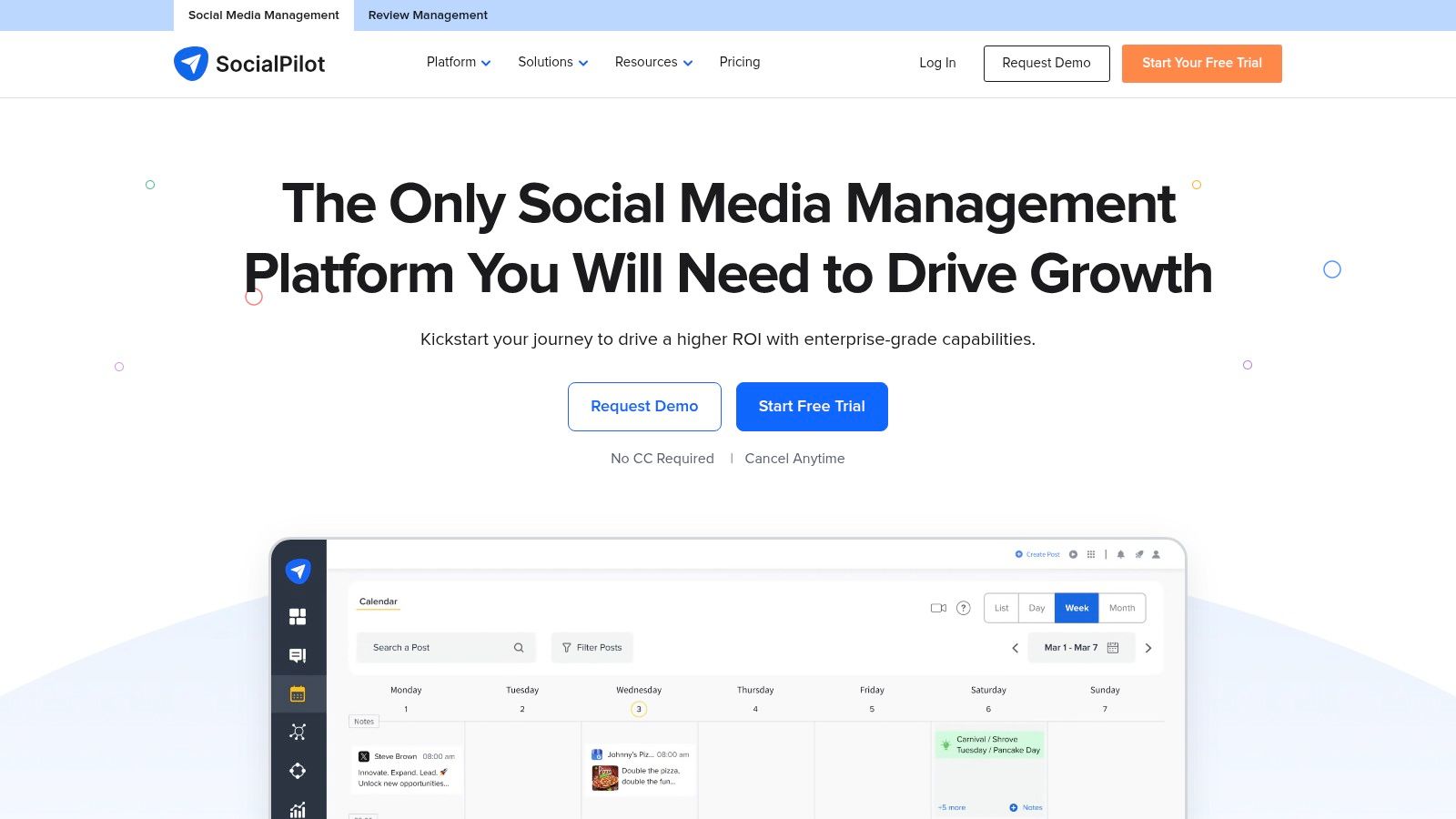
Key Agency Features & Use Cases
SocialPilot’s feature set is built with agency workflows in mind. The client management dashboard allows agencies to invite clients to connect their own accounts without sharing credentials, and approval workflows ensure content is signed off before publishing. Bulk scheduling via CSV upload is another time-saving feature, perfect for planning large content calendars.
A significant advantage for agencies is the ability to generate white-label reports. This allows you to add your own branding to analytics reports, presenting a professional and cohesive front to clients. For agencies focused on branding consistency, learning more about white label social media management can be a strategic advantage.
Pricing and Limitations
SocialPilot's pricing model is its biggest differentiator, offering significant value for the cost. Plans are structured around the number of users and social accounts rather than a high per-seat fee. The Agency plan starts at just $100 per month for 10 users and 50 social media accounts. However, some advanced features, like a dedicated account manager and advanced white-labeling, are reserved for higher-tier plans.
| Feature | Agency Plan ($100/mo) | Agency+ Plan ($200/mo) |
|---|---|---|
| Social Media Accounts | 50 Accounts | 75 Accounts |
| Users Included | 10 Users | 20 Users |
| Client Management | Yes | Yes |
| White-Label Reports | Basic | Advanced |
| Bulk Scheduling | Yes | Yes |
Pros:
- Highly affordable and scalable pricing for growing agencies.
- Generous user and social account limits on all plans.
- Strong white-label reporting and client management features.
Cons:
- Lacks the deep social listening and advanced analytics of enterprise tools.
- User interface is more functional than polished compared to premium competitors.
Website: https://www.socialpilot.co
7. Buffer
Buffer is a well-established and accessible platform known for its simplicity and affordability, making it one of the best social media management tools for agencies just starting out or those with lean operations. It offers a clean, intuitive interface for planning, scheduling, and analyzing social media content without the complexity of enterprise-level systems. Its unique channel-based pricing provides a flexible, modular approach to scaling.
The platform is split into distinct products: Publishing, Analytics, and Engagement. This allows agencies to pick and choose the tools they need, paying only for specific functionalities. For agencies focused primarily on content scheduling and straightforward performance tracking, Buffer delivers a focused and efficient experience that is incredibly easy to adopt.
Key Agency Features & Use Cases
Buffer's primary appeal for agencies lies in its straightforward collaboration and transparent pricing. The Team plan allows for unlimited users, which is a major cost advantage over per-seat models. This plan includes draft creation and approval workflows, where junior members can submit posts for manager review before they go live, ensuring client content remains on-brand.
The platform is ideal for agencies managing clients who need consistent content publishing and clear, easy-to-understand performance reports. While not as deep as competitors, its analytics provide essential metrics on reach, engagement, and audience growth in a visually appealing format. The availability of a significant nonprofit discount also makes it a go-to choice for agencies serving that sector.
Pricing and Limitations
Buffer’s pricing is based on the number of social channels you connect, not the number of users. The Essentials plan starts at $6 per channel/month, while the Team plan, which includes unlimited users and approval workflows, is $12 per channel/month. This model can be cost-effective for small teams but can add up quickly for agencies managing numerous client profiles.
While excellent for publishing, Buffer's feature set is more limited in other areas. It lacks advanced social listening, in-depth competitor analysis, and the sophisticated governance features found in more expensive tools.
| Feature | Essentials Plan ($6/channel/mo) | Team Plan ($12/channel/mo) |
|---|---|---|
| Users | 1 User | Unlimited Users |
| Channels | Priced per channel | Priced per channel |
| Approval Workflows | No | Yes |
| Branded Reports | No | Yes |
| Nonprofit Discount | Yes (50%) | Yes (50%) |
Pros:
- Transparent and flexible per-channel pricing model.
- Extremely easy to learn and use, perfect for new team members.
- Team plan includes unlimited users at no extra cost.
Cons:
- Lacks deep social listening and advanced analytics.
- Costs can escalate as an agency adds more client channels.
Website: https://buffer.com
8. Loomly
Loomly is a social media management platform that emphasizes brand success through collaboration and planning. It's particularly well-suited for agencies looking for a clean, visually-driven tool that simplifies the content creation, approval, and scheduling process. The platform offers a clear, step-by-step workflow for every post, from setting objectives and defining the audience to crafting copy and getting final sign-off, making it one of the more user-friendly social media management tools for agencies.
Its strength lies in its highly visual content calendar and straightforward approval system, which is easy for both team members and clients to adopt. Loomly provides post ideas, hashtag suggestions, and integrates with Canva, creating a seamless environment for producing polished content without leaving the platform. This focus on the pre-publishing phase makes it an excellent choice for teams that prioritize content quality and client collaboration.
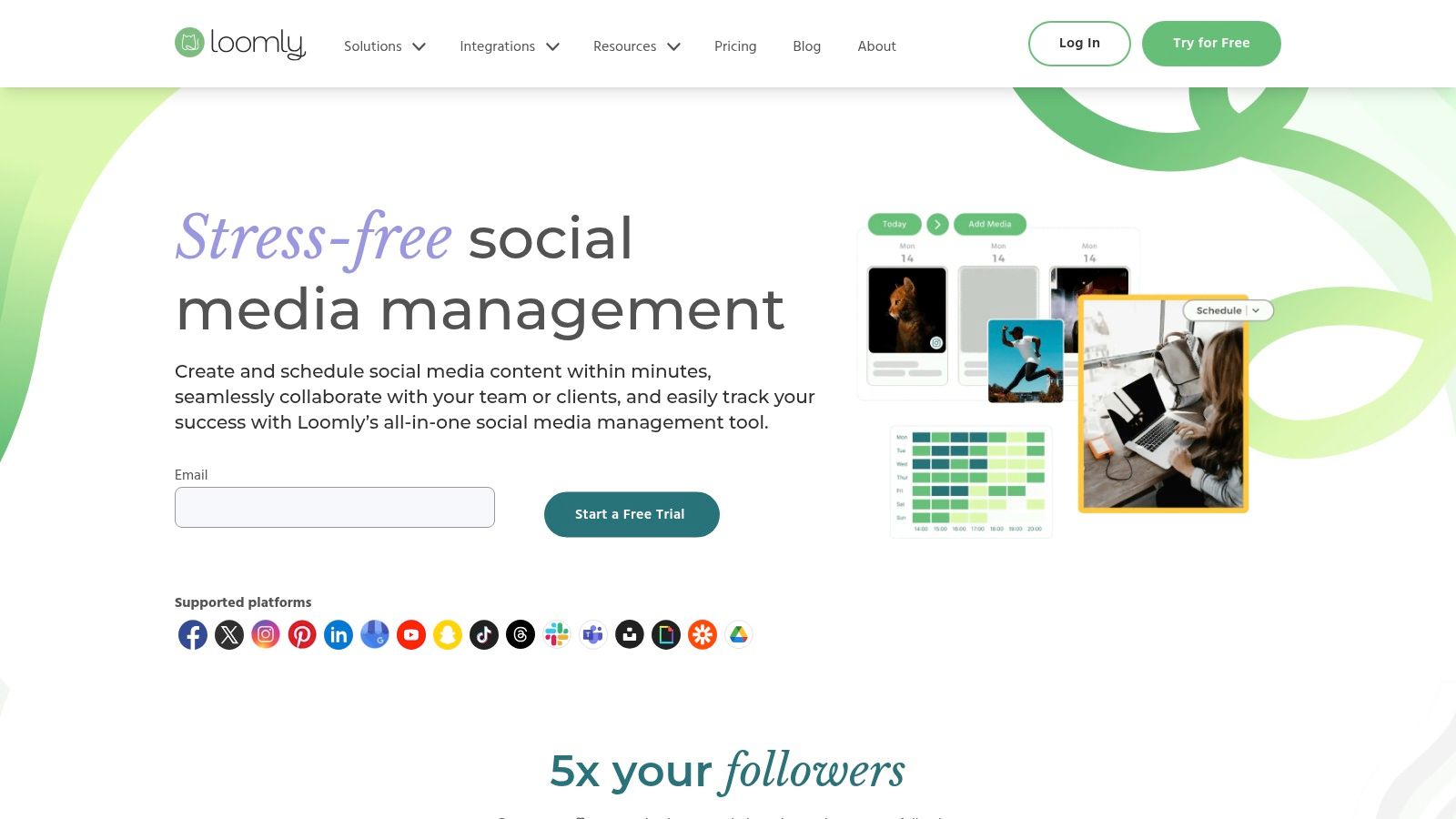
Key Agency Features & Use Cases
Loomly’s agency-centric features are designed to streamline client management and team workflows. The platform allows you to create separate, self-contained calendars for each client, complete with unique libraries for assets, brand guidelines, and post templates. This keeps client work organized and prevents any accidental crossover. The approval workflow is customizable, allowing for multi-level reviews before a post goes live.
For agencies focused on content strategy, Loomly provides an excellent framework for keeping everything organized. You can find out more about how to structure your strategy by exploring different approaches to building a social media content calendar. The "Post Ideas" feature, which suggests content based on trending topics, holidays, and RSS feeds, is a valuable tool for brainstorming and filling content gaps for multiple clients.
Pricing and Limitations
Loomly offers a more accessible entry point compared to enterprise-level tools. The pricing is based on the number of users and social accounts, with plans starting at $32/month for 2 users and 10 social accounts. However, crucial agency features like advanced analytics and custom workflows are reserved for the higher-tier plans, like the Premium and Enterprise options.
| Feature | Base Plan ($32/mo) | Standard Plan ($64/mo) | Advanced Plan ($132/mo) |
|---|---|---|---|
| Users | 2 Users | 6 Users | 14 Users |
| Social Accounts | 10 Accounts | 20 Accounts | 30 Accounts |
| Content Library | Yes | Yes | Yes |
| Advanced Analytics | No | Basic | Yes |
| Custom Roles & Workflows | No | No | Yes |
Pros:
- Very intuitive and clean user interface, ideal for client collaboration.
- Strong content ideation and planning features.
- Affordable entry-level pricing for small agencies.
Cons:
- Advanced analytics and reporting are limited to more expensive plans.
- Lacks the deep social listening and engagement features of competitors.
Website: https://www.loomly.com
9. HeyOrca
HeyOrca is a social media management tool built from the ground up specifically for agencies. Its entire philosophy revolves around simplifying the client approval process, positioning it as a standout choice for teams that prioritize collaboration and client satisfaction. The platform centers on a visual, calendar-based interface where agencies can plan, draft, and schedule content with a clear overview of each client’s upcoming posts.
The core strength of HeyOrca is its client-friendly collaboration workflow. It eliminates the need for messy spreadsheets or endless email chains by generating shareable, interactive links to content calendars. Clients can view mock-ups of posts exactly as they’ll appear on each platform and leave feedback or approve them with a single click, streamlining one of the biggest agency bottlenecks.
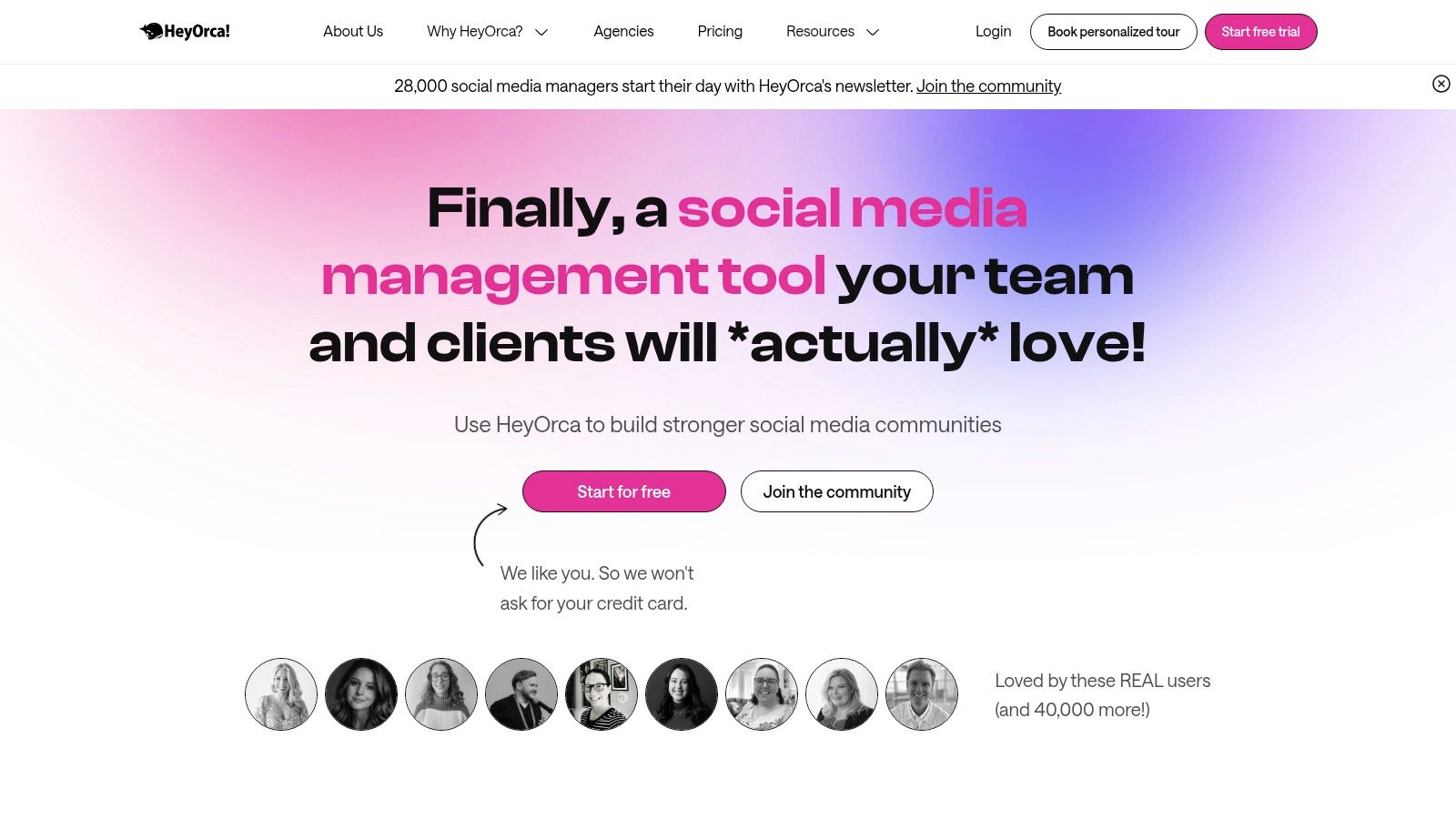
Key Agency Features & Use Cases
HeyOrca’s biggest selling point for agencies is its pricing model. Unlike many competitors, it charges per "calendar" (essentially a client or brand) rather than per user. All paid plans include unlimited users, making it incredibly scalable for growing agency teams without incurring prohibitive per-seat costs.
The platform also offers automated, client-ready reports that can be branded with an agency's logo. A unique feature is the AI-powered report summary, which automatically generates key takeaways and performance insights, saving account managers valuable time when preparing client updates. This makes it an ideal solution for agencies managing a high volume of small to medium-sized clients.
Pricing and Limitations
HeyOrca offers a tiered pricing structure based on the number of calendars. The Basic plan starts at $59 per calendar/month, providing core scheduling features. The popular Pro plan, at $129 per calendar/month, adds advanced features like an inbox manager, AI text generation, and advanced reporting.
| Feature | Basic Plan ($59/calendar/mo) | Pro Plan ($129/calendar/mo) |
|---|---|---|
| Unlimited Users | Yes | Yes |
| Unlimited Approvals | Yes | Yes |
| Client-Shareable Links | Yes | Yes |
| Social Media Inbox | Add-on | Yes |
| AI Report Summaries | No | Yes |
Pros:
- Pricing model based on calendars, not users, is highly cost-effective for agencies.
- Exceptional client approval workflow simplifies collaboration and feedback.
- Clean, simple, and visual interface is easy for teams and clients to learn.
Cons:
- Lacks deep social listening or advanced competitor analysis features.
- Inbox and advanced reporting tools are only included in higher-tier plans.
Website: https://www.heyorca.com
10. Planable
Planable is a social media collaboration and approval tool designed from the ground up to reduce friction between agencies and their clients. It excels by focusing on one core problem: making the content review process as simple and visual as possible. The platform provides a pixel-perfect preview of how posts will look on each network, including feed, grid, and calendar views, eliminating guesswork for clients.
Its main differentiator is the incredibly intuitive approval workflow. Clients can review content, leave contextual comments directly on the mock-up posts, and approve them with a single click, all without needing to create an account. This low-barrier approach makes it a standout choice among the best social media management tools for agencies prioritizing client experience.
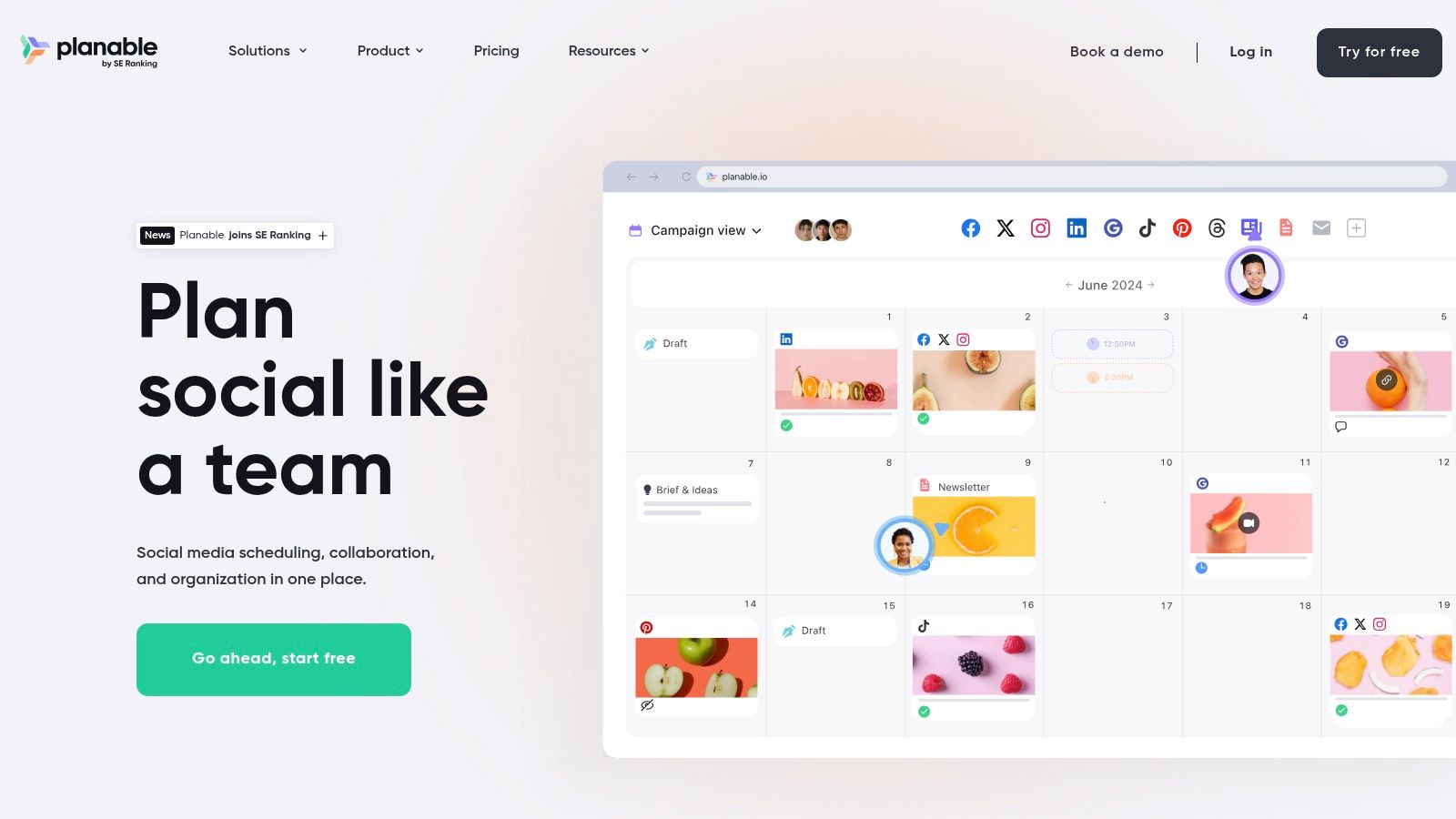
Key Agency Features & Use Cases
Planable is built for agency collaboration. Every paid plan includes unlimited user seats, which provides predictable pricing that doesn't penalize team growth. The platform supports granular, multi-level approval workflows (on Enterprise plans) that can mirror an agency’s internal structure, from content creator to account manager to the final client sign-off.
A key use case is managing content for visually-driven clients, such as those in e-commerce or hospitality. The ability to share a live link to a beautifully designed content calendar allows clients to see the bigger picture and approve assets with complete confidence. Versioning also allows teams to track changes and revert to previous drafts easily.
Pricing and Limitations
Planable offers a compelling pricing model, starting with a free plan for your first 50 posts. The Starter plan is $11 per user/month, while the popular Pro plan is $22 per user/month. However, essential features for many agencies, like engagement and analytics, are not included in the core plans and must be purchased as separate add-ons.
| Feature | Free Plan ($0) | Starter Plan ($11/user/mo) | Pro Plan ($22/user/mo) |
|---|---|---|---|
| Users | 1 | Unlimited | Unlimited |
| Workspaces | 1 | 1 | Unlimited |
| Posts | First 50 Posts | Unlimited | Unlimited |
| Approval Workflows | Basic | Basic | Basic |
| Analytics Add-On | No | Yes | Yes |
Pros:
- Extremely simple, no-login approval process for clients.
- Unlimited users on paid plans offer predictable, scalable costs.
- Excellent visual previews for all major platforms.
Cons:
- Engagement and analytics features are separate, paid add-ons.
- The free and lower-tier plans have limitations for X/Twitter functionality.
Website: https://planable.io
11. Zoho Social
Zoho Social stands out as a high-value, budget-friendly option among the best social media management tools for agencies. It provides a robust set of features, including publishing, monitoring, and reporting, but its primary strength lies in its seamless integration with the wider Zoho ecosystem. For agencies already using Zoho CRM or Zoho Desk, this platform offers a unified workflow that connects social media efforts directly to sales and customer support activities.
The platform is designed with multi-client management in mind, offering dedicated agency plans that simplify collaboration. Features like custom client portals, branded reports, and specific user roles allow agencies to provide a professional, white-labeled experience. This makes it an excellent choice for agencies seeking an affordable yet scalable solution to manage a growing client roster without sacrificing core functionality.
Key Agency Features & Use Cases
Zoho Social's agency plans are built for efficiency. The Agency plan and Agency Plus plan include features to manage multiple brands from a single dashboard, each with its own dedicated content calendar, reporting, and asset library. Client portals are a significant benefit, allowing clients to log in, view draft posts, and approve content directly, streamlining the sign-off process.
The deep integration with Zoho CRM is a powerful use case. Agencies can track leads generated from social media, attribute revenue to specific campaigns, and provide clients with tangible ROI data that connects social activity to business outcomes. This transforms the social media report from a list of vanity metrics into a clear demonstration of value.
Pricing and Limitations
Zoho Social's pricing is highly competitive, making it accessible for agencies of all sizes. The Agency plan starts at a reasonable $230/month for 10 brands, with the more feature-rich Agency Plus plan at $330/month for 20 brands. Unlike many competitors, these prices are not per-user, offering excellent value for growing teams.
The main limitation is that the user interface can sometimes feel less polished than premium alternatives, with some consistency variations between modules. Furthermore, the most advanced analytics and reporting features are reserved for the higher-tier plans.
| Feature | Agency Plan ($230/mo, billed annually) | Agency Plus Plan ($330/mo, billed annually) |
|---|---|---|
| Brands Supported | 10 | 20 |
| Custom Client Portals | Yes | Yes |
| Zoho CRM Integration | Yes | Yes |
| Content Approvals | Yes | Yes |
| White-Label & Branding | No | Yes |
Pros:
- Strong value and extensive features for its price point.
- Excellent native integration with other Zoho business tools like CRM and Desk.
- Agency-specific plans with client portals and multi-brand support.
Cons:
- User interface consistency can vary across different modules.
- Advanced analytics and white-labeling are limited to the highest agency tier.
Website: https://www.zoho.com/social
12. G2 Social Media Management Category
While not a tool itself, G2’s Social Media Management Category is an indispensable resource for agencies conducting due diligence. It functions as a comprehensive comparison marketplace, aggregating real-time rankings, verified user reviews, and feature comparisons. For agencies, this is the starting point to shortlist the best social media management tools before committing to demos or trials. It provides a crucial layer of social proof and peer-driven data that cuts through vendor marketing claims.
The platform allows you to filter tools based on specific criteria like company size, industry, and desired features, making it easy to find solutions tailored to agency needs. Its iconic G2 Grid visually plots vendors into Leaders, High Performers, Contenders, and Niche players based on market presence and customer satisfaction.
Key Agency Features & Use Cases
G2 is invaluable for validating a tool’s suitability for agency workflows. An agency can compare two or three shortlisted platforms side-by-side, analyzing user-rated scores for specific features like “Content Creation,” “Reporting & Analytics,” or “Social Campaign Management.” This allows you to see how a tool performs in the real world, according to users with similar needs.
The aggregated pros and cons, sourced from hundreds of reviews, offer a quick and honest snapshot of a platform’s strengths and weaknesses. Agencies can use this to identify potential deal-breakers or confirm that a tool’s praised features align with their clients' goals.
Pricing and Limitations
G2 is free to use for research and comparison. The platform's revenue comes from vendors who pay for enhanced profiles and lead generation, which can result in sponsored placements. While these are clearly labeled, it's a factor to be aware of when evaluating visibility.
Some of the feature data is provided by the vendors themselves, so cross-referencing claims with recent user reviews is always a recommended best practice.
| Feature | G2 Social Media Management Category |
|---|---|
| Access | Free |
| Vendor Comparison | Yes, side-by-side |
| Verified User Reviews | Yes |
| Pricing Information | Available for many vendors, often links to vendor site |
| Filtering Options | By company size, industry, user satisfaction, features |
Pros:
- Provides broad coverage of the market with up-to-date, verified user feedback.
- Excellent filtering and side-by-side comparison features to narrow down choices.
- Free to access and use for initial research and shortlisting.
Cons:
- Sponsored placements can influence vendor visibility on category pages.
- Some data is vendor-submitted, requiring independent verification.
Website: https://www.g2.com/categories/social-media-mgmt
Top 12 Social Media Management Tools Comparison
| Platform | Core Features / Unique Selling Points ✨ | User Experience / Quality ★★★★☆ | Value Proposition 💰 | Target Audience 👥 | Pricing & Access 💰 |
|---|---|---|---|---|---|
| MakerBox 🏆 | AI-driven optimized bios, portrait magic, multi-platform content, scheduling | 3.5× engagement, 87% more connections, fast 30s creation | Lifetime Deal $19.99; full AI control with own API key | Professionals, freelancers, agencies | Lifetime deal $19.99 (limited); pay-per-use with API |
| Sprout Social | Enterprise-grade publishing, listening, reporting, multi-client workflows | Excellent reporting, strong collaboration | Powerful analytics; suited for large agencies | Agencies, enterprises | Per-seat pricing; add-ons for listening |
| Hootsuite | Broad social support, bulk scheduling, team workflows | Mature platform, scalable from small to large teams | Comprehensive but pricier at scale | Agencies, teams of all sizes | Tiered pricing, higher tiers unlock advanced features |
| Agorapulse | Publishing, inbox mgmt, social listening, ROI tracking, white-label reporting | Client-facing reporting, scales well | Strong agency features; per-user & profile fees | Agencies, enterprises | Per-user pricing; advanced features in higher tiers |
| Sendible | Multi-client publishing, approvals, dashboards, white-label | Easy onboarding, agency-focused | Good agency value; no-contract options | Agencies | Tiered pricing; some advanced features in higher tiers |
| SocialPilot | Scheduling, inbox, analytics, client approvals, white-label | Competitive pricing, simple bulk scheduling | Cost-effective for growing agencies | Growing agencies | Affordable plans with white-label on higher tiers |
| Buffer | Channel-based pricing, publishing, analytics, basic approvals | Easy to use, good for small teams | Affordable but costs rise with channels | Small agencies, lean teams | Per-channel pricing |
| Loomly | Visual calendars, Canva integration, approvals | Intuitive interface, client-friendly | Balanced pricing; good scheduling and approvals | Agencies, clients | Mid-tier price points; limited advanced analytics |
| HeyOrca | Calendar scheduling, unlimited users/approvals, AI reporting | Client collaboration focus, simple workflows | Pricing based on calendars, not users | Agencies focused on client approval | Calendar-based pricing |
| Planable | Multi-level approvals, external sharing, add-ons for inbox & analytics | Low friction client reviews, unlimited users | Predictable costs; add-ons for engagement and analytics | Agencies, enterprises | Paid add-ons for engagement & analytics |
| Zoho Social | Multi-brand support, CRM integration, custom workflows | Strong features for price, mixed UI consistency | Budget-friendly with Zoho ecosystem integration | Agencies using Zoho suite | Agency plans with advanced tiers |
| G2 Social Media Mgmt | Marketplace with reviews, ranking, pricing snapshots | Verified user feedback, broad vendor coverage | Tool comparison & choice facilitation | Agencies, buyers | Free access |
Making Your Final Decision: It's About Workflow, Not Just Features
Navigating the landscape of social media management platforms can feel overwhelming. We've analyzed comprehensive solutions like Sprout Social and Hootsuite, explored agency-centric powerhouses such as Agorapulse and Sendible, and delved into collaboration-focused tools like Planable and HeyOrca. Yet, the core takeaway isn't about crowning a single winner. The quest for the best social media management tools for agencies is less about finding the platform with the longest feature list and more about identifying the one that seamlessly integrates with your agency’s unique workflow.
A feature is only valuable if it solves a real problem. A state-of-the-art reporting suite is useless if your clients only care about two key metrics. Likewise, an intricate approval system creates friction if your team thrives on agility and speed. The right tool acts as a force multiplier, amplifying your team's efficiency, creativity, and ability to deliver exceptional client results. The wrong one becomes a bottleneck, adding unnecessary complexity and administrative overhead.
A Practical Framework for Your Final Choice
Instead of getting lost in feature-for-feature comparisons, reframe your evaluation process around your operational reality. Use these guiding questions to filter your options and move confidently toward a decision:
- What is our biggest workflow bottleneck? Is it client approvals? Content creation and scheduling? Reporting and analytics? Pinpoint your primary pain point and prioritize tools that excel in solving that specific problem. For example, agencies struggling with approvals should look closer at HeyOrca and Planable.
- How complex are our client reporting needs? If you serve data-driven enterprise clients, the robust analytics of Sprout Social or Agorapulse are non-negotiable. If your clients need simple, high-level summaries, a tool like Buffer or SocialPilot might be more than sufficient and more cost-effective.
- What is our true budget? Look beyond the monthly subscription fee. Factor in the cost of onboarding, training your team, and potential add-ons. Calculate the price per user and per client to understand the tool's scalability as your agency grows. Sendible and SocialPilot often stand out here for their agency-friendly pricing models.
- How important is team and client collaboration? For agencies that operate as a close-knit extension of their clients' teams, tools built around a collaborative core are essential. This is where platforms designed for seamless feedback loops and transparent content calendars truly shine.
Implementation: Beyond the "Buy Now" Button
Selecting a tool is only half the battle. Successful implementation requires a strategic plan. Once you've made your choice, focus on creating standardized operating procedures (SOPs) for your team. Document everything from how to set up a new client and tag content to the exact steps for generating a monthly report.
This documentation ensures consistency across all accounts and simplifies the onboarding process for new hires. It also transforms your tool from a simple software subscription into a central pillar of your agency's operational system. To truly optimize agency operations, understanding effective automated social media posting strategies is crucial for streamlining client workflows and maximizing the power of your new platform.
Ultimately, the best social media management tool is the one your team will actually use and love. It should feel less like a chore and more like a trusted partner in your agency's success. Take advantage of free trials, involve your team in the decision-making process, and choose the platform that empowers you to do your best work, for every client, every day.
Ready to move from managing social media to building a powerful growth engine? MakerBox provides the frameworks, playbooks, and community support agencies need to scale their marketing efforts and achieve repeatable success. Stop guessing and start growing with proven strategies from top-tier marketers.
